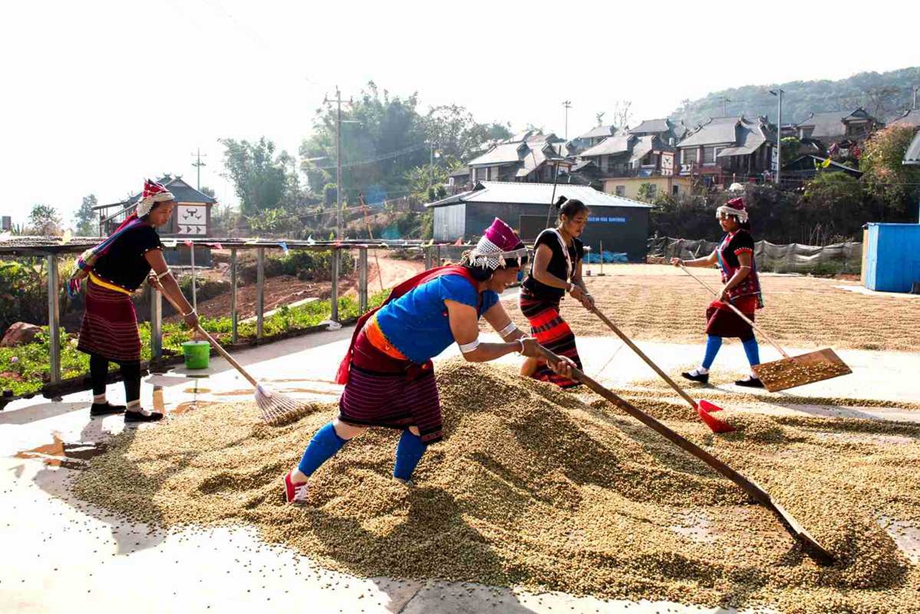Buzz brewing for quality Yunnan coffee beans
 Farmers dry out coffee beans at Tianyu's cultivation area in Yunnan province. WANG BANGXU/FOR CHINA DAILY
Farmers dry out coffee beans at Tianyu's cultivation area in Yunnan province. WANG BANGXU/FOR CHINA DAILY
Prices percolating as demand rises; shortage in Brazil inspires searing rally in market
With coffee beans in short supply worldwide and Chinese consumers expanding their coffee habit, Yunnan province beans have increasingly appeared in major coffee chains in China as prices rise.
Yunnan, the largest coffee cultivation area in China, is blessed with high altitudes and a favorable climate ideal for cultivating high-quality coffee beans.
The province is the source of more than 99 percent of domestically produced coffee. Hainan and Sichuan provinces both have less than 0.5 percent of market share, according to the Ministry of Agriculture and Rural Affairs.
"Yunnan's local government holds the development of the coffee industry in high regard, and the region's natural conditions are suited to producing high-quality beans. By 2024, Yunnan aims to lift the proportion of premium coffee beans to about 30 percent of its total output," said Li Xiaobo, chairman of the Coffee Association of Yunnan.
Last year, Brazil, the world's largest coffee producing country, experienced extreme weather, including drought and frost, at harvest time. It has led to a decline in output of nearly 20 percent year-on-year, according to Brazilian food supply and statistics agency Conab.
Prices of coffee made with Arabica beans, often used by chains such as Starbucks, hit 10-year highs in New York starting late last year. Inventory levels, at their lowest level in 20 years, were responsible, according to the Intercontinental Exchange, known as ICE.
Logistics issues also have contributed to the price increase-the COVID-19 pandemic has hampered the timely transportation of coffee beans to overseas markets.
With coffee from international markets in short supply, Yunnan has drawn the attention of coffee chains and retailers in China.
Ye Ping, a coffee farmer in Pu'er, Yunnan, for more than a decade, said she has seen the volume and prices of orders double from last year.
In 2011, she founded her Tianyu brand for coffee. It now has more than 200 farmers in its agricultural cooperative, and the cultivation area exceeds 134 hectares, she said.
With increasingly advanced planting technologies and higher-quality local coffee beans, her company ships its product to renowned coffee chains such as Starbucks and Manner Coffee, a new Shanghai-based chain.
Ye first learned planting techniques from an agronomist at Nestle. The Swiss food retailer had launched a cooperative program in Yunnan to help train local planters. Ye said she still checks with Nestle agronomists for help with coffee tree diseases and pests.
"The coffee picking season is usually between December and mid-March. Now it's time to clean up dead branches and wait for coffee trees to bloom. If the picking time is too late, it will affect the output of coffee beans in the upcoming year. To plant new trees, we usually sow seeds in July," Ye said.
"After picking, we transport the beans to a processing plant in town before sending the finished product to our customers. Due to the pandemic, we mostly promote the products online through the messaging app WeChat and other social media platforms like Douyin, instead of through offline methods," she said.
Baoshan Chunzheng Coffee Industry Development Co Ltd, a major coffee provider in Yunnan, also said the inadequate supply of beans has led to increased prices this year.
Last year, the company sold ordinary commercial coffee beans for 26 yuan ($4.08) per kilogram wholesale. This year, the price rose to 32 yuan per kg. Premium coffee beans this year are being sold for 40 to 80 yuan.
Baoshan Chunzheng is providing unroasted coffee beans to Yum China, which operates fast-food chains KFC and Pizza Hut in the country. Yum China orders from a number of coffee providers, and Baoshan Chunzheng accounts for about 30 percent of the total.
"International corporations that are doing business in China are increasingly raising the proportion of coffee beans planted in Yunnan in their total usage, given that local purchases are more convenient. By supporting coffee cultivation in Yunnan, multinationals can contribute to rural revitalization of the province and practice their corporate social responsibility," said Li of the coffee association, who is also general manager of Baoshan Chunzheng.